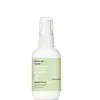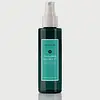What's inside
What's inside
 Key Ingredients
Key Ingredients

 Benefits
Benefits

 Concerns
Concerns

 Ingredients Side-by-side
Ingredients Side-by-side

Water
Skin ConditioningGlycerin
HumectantLeuconostoc/Radish Root Ferment Filtrate
AntimicrobialEpilobium Fleischeri Flower/Leaf/Stem Extract
Skin ConditioningHamamelis Virginiana Extract
AntiseborrhoeicSalvia Hispanica Seed Extract
EmollientAlchemilla Vulgaris Extract
AstringentYucca Schidigera Leaf/Root/Stem Extract
CleansingCoconut Acid
CleansingLactobacillus Ferment
Skin ConditioningCucumis Sativus Fruit Extract
EmollientCamellia Sinensis Leaf Extract
AntimicrobialCitrus Aurantium Bergamia Fruit Extract
Skin ConditioningCitrus Limon Peel Extract
EmollientPyrus Malus Fruit Extract
Skin ConditioningRubus Idaeus Fruit Extract
AstringentSalvia Officinalis Leaf Extract
CleansingVaccinium Macrocarpon Fruit Extract
AstringentRosmarinus Officinalis Leaf Extract
AntimicrobialVanilla Planifolia Fruit Extract
Skin ConditioningLavandula Angustifolia Flower/Leaf/Stem Extract
MaskingSalvia Sclarea Extract
AntiseborrhoeicSorbitan Oleate Decylglucoside Crosspolymer
CleansingTriethyl Citrate
MaskingLevulinic Acid
PerfumingSodium Levulinate
Skin ConditioningSodium Phytate
Citric Acid
BufferingWater, Glycerin, Leuconostoc/Radish Root Ferment Filtrate, Epilobium Fleischeri Flower/Leaf/Stem Extract, Hamamelis Virginiana Extract, Salvia Hispanica Seed Extract, Alchemilla Vulgaris Extract, Yucca Schidigera Leaf/Root/Stem Extract, Coconut Acid, Lactobacillus Ferment, Cucumis Sativus Fruit Extract, Camellia Sinensis Leaf Extract, Citrus Aurantium Bergamia Fruit Extract, Citrus Limon Peel Extract, Pyrus Malus Fruit Extract, Rubus Idaeus Fruit Extract, Salvia Officinalis Leaf Extract, Vaccinium Macrocarpon Fruit Extract, Rosmarinus Officinalis Leaf Extract, Vanilla Planifolia Fruit Extract, Lavandula Angustifolia Flower/Leaf/Stem Extract, Salvia Sclarea Extract, Sorbitan Oleate Decylglucoside Crosspolymer, Triethyl Citrate, Levulinic Acid, Sodium Levulinate, Sodium Phytate, Citric Acid
Water
Skin ConditioningAloe Barbadensis Leaf Juice
Skin ConditioningNiacinamide
SmoothingBabassu Oil Glycereth-8 Esters
EmulsifyingSodium Hyaluronate
HumectantCamellia Sinensis Leaf Extract
AntimicrobialCucumis Sativus Seed Oil
EmollientPyrus Malus Fruit Extract
Skin ConditioningRubus Idaeus Fruit Extract
AstringentVaccinium Macrocarpon Fruit Extract
AstringentCitrus Aurantium Bergamia Fruit Extract
Skin ConditioningCitrus Limon Peel Extract
EmollientLavandula Angustifolia Flower/Leaf/Stem Extract
MaskingRosmarinus Officinalis Leaf Extract
AntimicrobialSalvia Officinalis Leaf Extract
CleansingSalvia Sclarea Extract
AntiseborrhoeicVanilla Planifolia Fruit Extract
Skin ConditioningPhenoxyethanol
PreservativeSorbitan Oleate Decylglucoside Crosspolymer
CleansingSodium Benzoate
MaskingPotassium Sorbate
PreservativeCitric Acid
BufferingDisodium EDTA
Triethyl Citrate
MaskingLimonene
PerfumingLinalool
PerfumingAmyl Cinnamal
PerfumingCitral
PerfumingWater, Aloe Barbadensis Leaf Juice, Niacinamide, Babassu Oil Glycereth-8 Esters, Sodium Hyaluronate, Camellia Sinensis Leaf Extract, Cucumis Sativus Seed Oil, Pyrus Malus Fruit Extract, Rubus Idaeus Fruit Extract, Vaccinium Macrocarpon Fruit Extract, Citrus Aurantium Bergamia Fruit Extract, Citrus Limon Peel Extract, Lavandula Angustifolia Flower/Leaf/Stem Extract, Rosmarinus Officinalis Leaf Extract, Salvia Officinalis Leaf Extract, Salvia Sclarea Extract, Vanilla Planifolia Fruit Extract, Phenoxyethanol, Sorbitan Oleate Decylglucoside Crosspolymer, Sodium Benzoate, Potassium Sorbate, Citric Acid, Disodium EDTA, Triethyl Citrate, Limonene, Linalool, Amyl Cinnamal, Citral
Ingredients Explained
These ingredients are found in both products.
Ingredients higher up in an ingredient list are typically present in a larger amount.
Camellia Sinensis Leaf Extract is derived from the leaves of the tea plant. Black tea, green tea, and oolong tea are all harvested from this plant.
This ingredient has many skin benefits:
This ingredient contains polyphenols, a strong antioxidant. Antioxidants help fight off molecules that damage skin cells.
On top of that, the antioxidants in green tea neutralize free-radicals from the sun. This gives the skin some extra UV protection, but should not replace sunscreen.
Many components of tea have anti-inflammatory properties.
Polyphenols and L-theanine help soothe the skin and reduce irritation. The caffeine in Camellia Sinensis Leaf Extract helps calm inflamed blood vessels.
Other compounds found in tea include: Vitamin Bs, linoleic acid, magnesium, calcium, iron, and zinc.
Research has shown both drinking Camellia Sinensis Leaf Tea and applying it to the skin can help boost skin elasticity and hydration. Studies also show using tea extract may reduce sebum, or oil, production.
Learn more about Camellia Sinensis Leaf ExtractCitric Acid is an alpha hydroxy acid (AHA) naturally found in citrus fruits like oranges, lemons, and limes.
Like other AHAs, citric acid can exfoliate skin by breaking down the bonds that hold dead skin cells together. This helps reveal smoother and brighter skin underneath.
However, this exfoliating effect only happens at high concentrations (20%) which can be hard to find in cosmetic products.
Due to this, citric acid is usually included in small amounts as a pH adjuster. This helps keep products slightly more acidic and compatible with skin's natural pH.
In skincare formulas, citric acid can:
While it can provide some skin benefits, research shows lactic acid and glycolic acid are generally more effective and less irritating exfoliants.
Most citric acid used in skincare today is made by fermenting sugars (usually from molasses). This synthetic version is identical to the natural citrus form but easier to stabilize and use in formulations.
Read more about some other popular AHA's here:
Learn more about Citric AcidCitrus Aurantium Bergamia Fruit Extract comes from the bergamot orange.
Bergamot oranges contain antioxidants, dietary fiber, vitamins such as Vitamin C, and minerals.
Citrus Limon Peel Extract is created from the peel of a lemon. Lemon peels contain Vitamin C. Lemon peels also exhibit antibacterial, antioxidant, and antifungal properties.
This ingredient comes from the lavender plant. It is used to add a scent or mask an unpleasant one in products.
Lavender contains linalool and linalyl acetate.
When exposed to air, these two compounds become strong allergens. This ingredient exhibits cytotoxicity at low concentrations; amounts of 0.25% have been shown to damage skin cells.
Learn more about Lavandula Angustifolia Flower/Leaf/Stem ExtractPyrus Malus Fruit Extract is extract from Apples. Apples are rich in Vitamin C, sugars, and antioxidants.
The sugar in Apples are humectants and help hydrate the skin. On top of that, apples also contain some acids, such as malic acid. These acids may have a mild exfoliating effect.
Last, the phytochemicals found in apples are strong antioxidants. These antioxidants help with anti-aging as they protect your skin cells against oxidative damage.
Learn more about Pyrus Malus Fruit ExtractRosmarinus Officinalis Leaf Extract comes from rosemary. Rosemary is native to the Mediterranean.
While Rosmarinus Officinalis Leaf Oil can be volatile due to its fragrant properties, the fragrance components are usually removed in the leaf extract.
Rosemary Leaf Extract contains many antioxidants such as rosmarinic acid and caffeic acid. Rosemarinic acid, a compound found in rosemary leaf, has been found to help soothe skin conditions such as eczema and acne.
Learn more about Rosmarinus Officinalis Leaf ExtractWe don't have a description for Rubus Idaeus Fruit Extract yet.
Sage leaf extract is a culinary and medicinal herb with antibacterial, antioxidant, and soothing properties.
This ingredient is made up of 75-90% ursolic acid, a potent antioxidant and anti-inflammatory compound.
We don't have a description for Salvia Sclarea Extract yet.
Sorbitan Oleate Decylglucoside Crosspolymer is also known as Poly Suga®Mulse D9 (We'll call is SODC for short).
SODC is a nonionic fragrance solubilizer. A solubilizer blends small amounts of oils into water-based formulas. It is especially good at solubilizing fragrances in water-only systems.
SODC does not contain PEGs. It is hydrophilic, meaning it has the tendency to mix with water.
In products, SODC acts as an emulsifer by blending waters and oils.
Learn more about Sorbitan Oleate Decylglucoside CrosspolymerTriethyl Citrate comes from citric acid. It has masking, perfuming, and solvent properties. As a solvent, this ingredient helps disperse ingredients evenly in skincare.
One manufacturer claims this ingredient can:
According to perfume manufacturers, this ingredient is almost odorless but has a mild fruity, wine and plum scent. It can be used to mask the scent of other ingredients.
This ingredient can be plant-sourced or synthetic; it can naturally be found in cabbage and white wine.
Learn more about Triethyl CitrateVaccinium Macrocarpon Fruit Extract comes from the cranberry fruit. Vaccinium Macrocarpon is the North American species of cranberries native to eastern Canada.
As an astringent, cranberry extract helps tighten the pores by constricting the cells.
Cranberries contain Vitamin E and Vitamin C, both potent antioxidants. It also contains minerals such as manganese and copper.
Learn more about Vaccinium Macrocarpon Fruit ExtractVanilla Planifolia Fruit Extract comes from the vanilla orchid native to central America. It is a skin-soothing ingredient.
This ingredient is skin-soothing and contains polyphenols that give it antioxidant properties.
This ingredient is not known to sensitize or irritate skin (unlike Vanilla Tahitensis). Vanilla tahitensis has shown to irritate skin in low amounts.
Learn more about Vanilla Planifolia Fruit ExtractWater. It's the most common cosmetic ingredient of all. You'll usually see it at the top of ingredient lists, meaning that it makes up the largest part of the product.
So why is it so popular? Water most often acts as a solvent - this means that it helps dissolve other ingredients into the formulation.
You'll also recognize water as that liquid we all need to stay alive. If you see this, drink a glass of water. Stay hydrated!
Learn more about Water